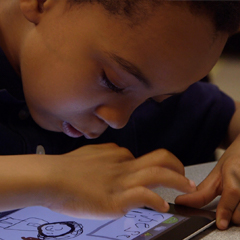
Jen Humke, Senior Program Officer, Journalism and Media, shares resources and tips for digital learning for people with kids at home due to COVID-19.
More than a decade after the publication of Hanging Out, Messing Around, and Geeking Out, a book by Dr. Mimi Ito based on her groundbreaking research about how online spaces could be used for learning, we find ourselves in a real-world scenario in which parents, educators, and politicians are scurrying to find useful and productive opportunities for our children to learn remotely and maintain social ties.
The reality is that it is easier for some families and students to take advantage of these opportunities than others, for a range of reasons, most notably connectivity and cost. There also is an overabundance of education technology being peddled to parents and school districts, and it can be difficult to sort the honest learning experiences from the snake oil. Being homebound myself, I have had time to reflect on and sort through some of the learnings from MacArthur’s 10-year, $300 million initiative in Digital Media and Learning (DML), which I share below.
The DML initiative, for which I was a Program Officer, ran from 2006-2015 and was designed to reimagine learning for the digital age. We had a special focus on making access to learning more equitable and learning experiences more relevant to all young people. We supported Dr. Ito’s research, which led to her book, with one of the first grants we made as part of that initiative, and she continues to research and experiment with online learning.
The DML initiative also supported other important research about online learning and teaching, funded the prototyping of online learning spaces and experiences, and provided grants for the development of new tools and curricula that could make online learning more accessible and equitable.
Here are some of those tools, resources, and advice from experts that may be helpful for you and the students in your life as we all do our part to help flatten the COVID-19 curve:
- Educator Innovator, a network of online learning providers established with MacArthur funding, recommends a range of learning experiences that can be done online with others or downloaded and done offline, for all K-12 age groups.
- The National Writing Project, an anchor grantee of the DML initiative, has launched a special media literacy curriculum to help middle- and high-school students stuck at home sift through COVID-19 news and information online and practice good “information hygiene.”
- YR Media, a youth media production house in the Bay Area, features stories from a national network of youth reporters sharing the ways in which important issues, including COVID-19, are experienced by youth. YR Media reporters also recommend relevant online content for youth and provides opportunities for online discussion about them.
- The Connected Learning Alliance, a network of educators, researchers, and technology makers harnessing the power of technology for learning led by Dr. Mimi Ito, provides advice to parents and educators about how to provide effective learning experiences and stay resilient during the COVID-19 pandemic.
- Common Sense Media provides reviews for parents about media that is relevant for their children, including video games, TV, and movies.
There are many other online learning resources and curricula that emerged with funding through MacArthur’s DML initiative. We will continue to enhance this list with other ideas to keep young people engaged in learning that is relevant and timely—that is, connected to real-world events and conversations—as we all hunker down at home to wait out the COVID-19 pandemic.



